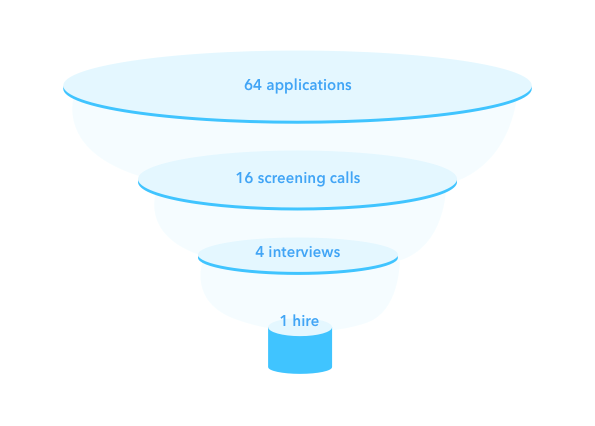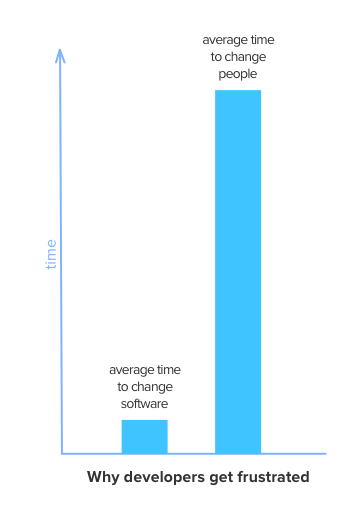The 3 Stages of Hiring
When you start to grow your business, you're going to do a lot of hiring. Hiring will no longer be a rare activity you do once every 3 months. Instead, it will be a constant process of attracting new candidates, figuring out who’s the best, and keeping the talent pipeline full.
You can no longer just post an ad and hire the first decent candidate that applies. Because you'll need more specialized roles, you'll have to find specialists, know how to evaluate them, and hope they want to work for you.
You will need to adapt your hiring process in order to scale. Because you'll have to do this dance more often than before, you'll need a reliable and repeatable hiring process.
Hiring process
The hiring process has 3 stages: sourcing, screening, and interviewing.
You should roughly estimate how many people you need at each stage. A common rule of thumb is to move 25% of people from one stage to another. So, for example, if you're offering 1 job, you should interview 4 people, screen 16, and source 64.
This is not a hard-and-fast rule, but it can help you fine-tune the hiring process and see if there’s an imbalance in any of your stages.

Stage 1: Sourcing
Sourcing is the first stage, the one where you promote the position so people would apply. The goal is to get enough qualified applicants so you can proceed to the next stage.
There are 4 main recruiting channels through which you get candidates: in-house referrals, agency referrals, outbound, and inbound.
Stage 2: Screening
Screening is the part where you sift through CVs and decide who you'll schedule for a quick call.
Looking at all the resumes is time-consuming for business owners so you should outsource this to your line managers. They can color-code CVs by a level of interest and then you can scan the ones that your staff is most excited about.
You should use software to manage the application process and track applicants. The software can help you store all the candidate information, communicate with them, know the entire engagement history, and leave notes and comments.
For example, candidates will send you their CVs and other info, which will go into software’s database. Then a manager can go through the profiles and write notes. They can then mark a candidate as "to call", set an agreed date and time, and make comments after the call.
Once you make a shortlist, schedule a casual 15-minute screening call to find out why they applied and see if they’re a good fit. The goal is to assess if the candidate has the right motivation for applying and the necessary experience before moving to the interview stage, which will take a huge time investment on your part.
When you need someone with hard, technical skills, talk is not enough. You also have to test their skill and see if they actually know what they claim. You can make an online quiz or send something challenging by email before moving to the next stage.
At Flipboard, we built the site challenge.flipboard.com, where we post engineering problems. The goal here is to start a conversation as much as it is to screen for skills. We simply ask candidates about the challenge. Why did you decide to use this language? Why did you decide to implement it this way? - Eric Feng, former CTO at Flipboard
Stage 3: Interviewing
Once you narrow down the candidate list to 1.5% of its original size, you invite the finalists to your office, show them around, let them meet the team, and get to know them in-depth.
Every interview should be structured. This means you should ask each candidate the same set of questions (sub-questions can differ based on the response). This way you can compare candidates using the same measuring stick and remove bias.
Each interview should consist of several elements:
- Breaking the ice (chit-chat to relax the candidate)
- General questions (why they applied, employment history)
- Work questions (highly technical for the position they're applying)
- Cultural fit questions (to see if they'll fit in with the team)
- Admin stuff (salary, notice period, perks)
Wrap-up (ask if the candidate has any questions, thank them for their time, and let them know what happens next)
You want to extract as much information as you can, so use open-ended questions, which can't be answered with yes or no. Also, use situational questions because they’ll help you predict the candidate's performance better.
For example, if you're hiring a salesperson, don't ask them how would they sell you a pen but ask them to role-play and talk to you like you're a potential customer.
The whole idea of an interview is to try and predict how a candidate will do the job in the future. And the only way you can accurately predict future performance is by looking at their past performance. So focus on the candidate's work experience and really drill down on what they did and why.
If you don't know what questions to ask, google some ideas. But don't ask questions like "How many ping-pong balls could fit in an airplane". These kinds of questions were once popular but have fallen out of favor because no matter how a candidate answers, it won’t give you any insight about them (except how tolerant they are to dumb questions).
Don't focus on technical skills only. Look for attitude and character. You can teach them most of the technical know-how, but changing someone’s personality is impossible. You can't train someone to be nice - you have to hire nice.

Interviewing can take a lot of time, especially when you consider that several people have to attend it; remember that a typical 1-hour interview actually takes several hours (1 hour for each person present).
Don't be shy to cut the interview when you see the candidate is not the right fit. Don't feel you have to continue out of courtesy. You'll only waste both parties time. This will feel awkward the first several times you do it, but you'll get comfortable. And the candidate will respect you for it.
The processes you set up so your business can grow are worthless if you don’t have the right talent. You have to identify it, hire it, and nurture and reward it. And once it becomes irreplaceable, fire it.
